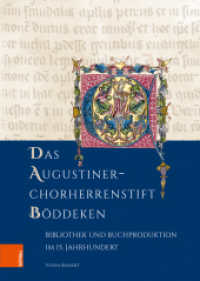- ホーム
- > 洋書
- > 英文書
- > Science / Mathematics
Full Description
In Knowledge, Patents, Power, Marius Buning tells the complex story of how the emergence of a Dutch patent regime is related to wider issues concerning governmental control and innovation. Buning analyses the institutional framework in which "innovative knowledge" could develop in the Dutch Republic from a variety of perspectives. This is not only a comprehensive study of patent law and its administrative and legal framework during the first four decades of the Dutch republic, it also opens up new perspectives on a wide range of issues in cultural and political history— from truth claims in early modern science to issues concerning mercantilism and Dutch seventeenth-century processes of state formation.
Contents
Acknowledgements
List of Figures and Tables
Introduction
Preliminary
Scope and objectives
Outline
1 Inventing a System
The Dutch Revolt: Setting the stage
Patents in the Habsburg Netherlands
The political organization of the Dutch Republic
Patents amidst constitutional confusion
Conclusions
2 Administrative Practices
The application process
Examinations and rewards
Areas of usage: war, trade and industry
Conclusions
3. Legitimate Monopolies
Historical backgrounds
Privileges as a legal instrument
Experimental practices
Conclusions
4. Merchants of Ideas
The dawn of projects
Venture capital
The applicants
Costumers and clients
Conclusions
5 The Circulation of Knowledge
Inventions and discoveries
Novelties and imitation
Competition and friendly exchange
Notions of efficiency
Conclusions
6. Conclusions: A Dutch Republic of Patents
Patents and the production of knowledge
Republican patents
The aftereffects
Bibliography
Index








